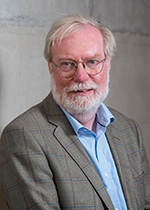Sir Paul Collier
Sir Paul Collier is Professor of Economics and Public Policy at the Blavatnik School of Government and a Professorial Fellow of St Antony’s College, Oxford. He is currently a Professeur invité at Sciences Po and a Director of the International Growth Centre.
His research covers the causes and consequences of civil war; the effects of aid and the problems of democracy in low-income and natural resources rich societies; urbanization in low-income countries; private investment in African infrastructure and changing organisational cultures.
“Africa urgently needs to build the capacity to tax. This initiative is the right thing at the right time.” - Paul Collier
Reflections
Q: Why is capacity building on taxation so important to the debate on effective development assistance efforts today?
A: Without revenue there is no state; without an effective state, there is no development. The development agencies know this and have been engaged in fiscal ‘capacity-building’ for decades. Yet revenues have remained too low relative to GDP: ‘Capacity building’ has evidently not built all the capacity needed. If something isn’t working, it makes sense to try a different approach that has worked in some other field. We have learned a lot from the health sector, where there have been major improvements. Médecins Sans Frontières pioneered a completely different approach, bringing doctors and other experts to where they were needed. This has triggered a plethora of ‘without borders’ initiatives, from lawyers to musicians, to even clowns. At last, it has been adopted in the vital matter of taxation.
Q: What new proposition does TIWB present for tax administrations seeking to improve their capacity to undertake audits?
A: Tax Inspectors Without Borders, like the other ‘without borders’ operations, sends specialists—in this case tax experts—to help developing countries collect more revenues. The best tax experts are gathered on a roster and become temporary employees of the governments they are there to serve. In contrast to the usual ‘capacity building’, their role is to do, not to talk about doing. They build local skills and motivate teams not by talk, but by example, working alongside the people who need to be doing a more effective job. The TIWB experts, serving as temporary staff, transfer skills empowering local staff to undertake audits of big companies that avoid paying tax locally through well-known schemes or scams. Africa is the biggest client for TIWB and more than ½ billion USD has been recovered globally—not bad for four years of work, run by a small team based at the OECD and UNDP.
Although TIWB is a modest operation, it challenges the conventional way we think about how outsiders can help development. Orthodoxy says core state functions are sovereign; foreigners should be at arm’s length and advise on some general notion of ‘capacity’. Yet TIWB’s foreign experts are welcomed as insiders by tax authorities—bringing vital specialised skills and being directly accountable to the host administration, not to a distant funding intermediary. TIWB’s starting point is revenue maximization, so well-defined and limited objectives flow from that imperative. This provides a sense of urgency and a focus on results. TIWB runs without heavy contracting or procurement arrangements, no lengthy consultancy reports gather dust, and there is minimal aid bureaucracy. ODA often funds the TIWB experts, but on a refreshingly unsentimental basis: how much extra tax revenue is raised as a result of the expert; and at what cost? To date, revenues raised have been over 60 times cost. That’s over USD 60 for every USD 1 spent. The development community is now committed to turning aid billions into impact trillions: the performance of TIWB is where we need to be.
Q: What role can TIWB play in the context of the ongoing international tax reforms?
A: TIWB works by being highly focused; but it needs a supportive environment. Tax authorities in developing countries are rightly becoming more assertive in influencing new international tax rules at the UN and the OECD, through the peer reviews in the Base Erosion and Profit Shifting work, and now on the thorny issue of taxing the digital economy. These processes - practical help, a stake in the rules and transparent peer reviews of implementation - go hand in hand in a virtuous circle.
TIWB’s experience can inspire the over-stretched governments of poor countries to fast-track the strengthening of core state functions by temporary infusions of specialist skilled people who work directly for the government and influence by example, in contrast to the arms-length reports, advice and pressure from donor agencies, with which they are all too familiar.


